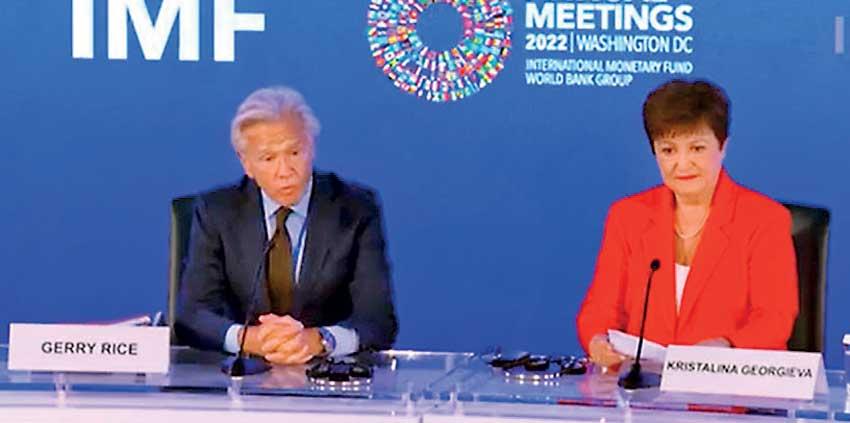Reply To:
Name - Reply Comment

Soon to retire IMF Director Communications Gerry Rise (left) and IMF Managing Director Kristalina Georgieva address a press briefing in Washington DC yesterday
As the International Monetary Fund (IMF) is looking to press for a more effective debt resolution mechanism, it is said efforts are underway to also explore avenues that will help expand donor coordination to middle-income countries such as Sri Lanka.
“We want the G20 Common Framework to become more predictable, with clear guidelines and equality of treatment for all creditors, public and private. We are also looking for ways to expand that kind of donor coordination to middle-income countries such as Sri Lanka,” said IMF Managing Director Kristalina Georgieva addressing a press briefing in Washington DC yesterday.
She asserted the need to support vulnerable emerging markets and developing countries. It is tough for everybody but it is even tougher for countries that are now being hit by a stronger dollar, high borrowing costs and capital outflows—a triple blow that is particularly heavy for countries that are under a high level of debt.
“We are focusing on debt this week, especially for low-income countries where over 60 percent are at or near debt distress,” added Georgieva.
The IMF called for stronger efforts to confront food insecurity as 345 million people are acutely food insecure. Children, women and men are at risk of dying because of hunger.
The briefing also highlighted the need for improved focus on transformational reforms to address climate change, to make digitalisation work for people and to address inequality.
“To confront these issues, we must act with a sense of urgency now and we must act together,” asserted the IMF Chief.
The IMF also launched the Global Policy Agenda this week, which makes an appeal to act with a sense of urgency now and to act together.
“We see very clear areas where we can do better, even in this more complex environment,” said Georgieva.
The first area was pointed out as bringing inflation down where central banks would need to take decisive action when necessary and communicate as clearly as they can.
The second is to put in place responsible fiscal policy, where there is a need to steer away from across-the-board fiscal support that is neither effective nor affordable.
“If we are to help people and fight inflation, we must ensure that fiscal and monetary policies go hand in hand. When monetary policy hits the brakes, fiscal policy should not step on the accelerator—that would make for a very dangerous ride,” said the IMF head.
The third area is to safeguard financial stability, particularly as financial sector risks are on the rise. In this regard, macroprudential policies need to be even more vigilant and proactively address pockets of vulnerability.